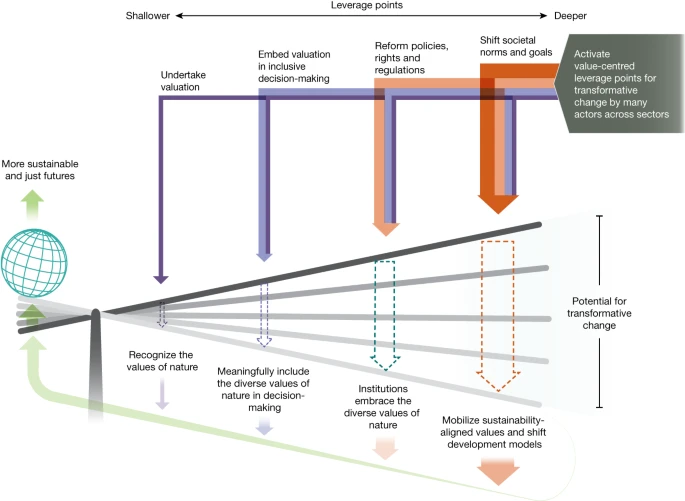Diverse Nature

In a study published in the journal Nature, Pascual et al. illustrate that integrating a wide spectrum of nature’s values into policy formulation and decision processes is crucial for a sustainable future.
Analysing over 50,000 scientific publications, policy documents and Indigenous and local knowledge sources published between 2010 and 2020, the Intergovernmental Platform on Biodiversity and Ecosystem Services (IPBES) assessed knowledge on nature’s values, as well as valuation methods, to shed light on their role in policy and decision making. Findings revealed a notable gap in valuing marine environments, although they account for over 70% of our planet’s surface. They also showed limited involvement of stakeholders during the valuation process, which can lead to an unbalanced representation of values in decision-making.
The authors emphasise the potential positive impact of integrating local and indigenous values into decision-making. Inclusion of these, particularly in protected areas and local resource management initiatives, tend to lead to more sustainable and just outcomes.
The study identifies a crucial issue: the power imbalances that often shape decision-making processes.
In many cases, values prioritised by influential stakeholders overshadow those of local communities and marginalised groups. This disconnect can lead to conflicts and compromised outcomes, highlighting the urgent need for a more balanced approach.
Barriers to uptake and valuations can be improved through addressing cultural significance and economic incentives together, to lead to transformative changes that are fair towards people and nature, including consideration of inter- and intragenerational equity.
Researchers identified four key values leverage points that hold the potential to drive transformative change, including short-term actions as well as more profound shifts in perspective. By embracing a comprehensive range of values, decision-makers can ensure that benefits and costs are distributed equitably.

By adopting a holistic valuation of nature, leveraging established valuation methods, and engaging stakeholders, policymakers can reshape the landscape of environmental management. This paradigm shift signifies a step towards addressing the ongoing global biodiversity crisis while honouring the unique viewpoints and needs of diverse communities.
Rather than solely relying on economic indicators, this study urges decision-makers to embrace an inclusive approach, that recognises the diverse range of values that are key to addressing the pressing sustainability challenges we face today.
Read the paper here.
See similar papers here.




